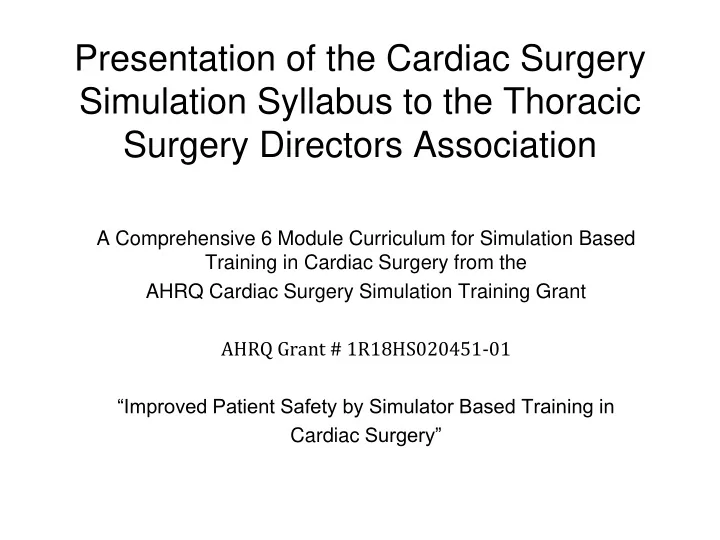

Presentation of the Cardiac Surgery Simulation Syllabus to the Thoracic Surgery Directors Association A Comprehensive 6 Module Curriculum for Simulation Based Training in Cardiac Surgery from the AHRQ Cardiac Surgery Simulation Training Grant AHRQ Grant # 1R18HS020451-01 “Improved Patient Safety by Simulator Based Training in Cardiac Surgery”
AHRQ Cardiac Surgery Training Grant AHRQ Grant # 1RH18RSO20451-01 • Collaboration of 8 institutions Cardiac Surgery Simulation Consortium • $1,049,298 over three years • 2 groups of 16 first year cardiothoracic residents - Total 32 residents
Improved Patient Safety by Simulator Based Training in Cardiac Surgery AHRQ Grant # 1R18HS020451-01 INVESTIGATORS Richard H. Feins, M.D. University of North Carolina Harold M. Burkhart, M.D. Mayo Clinic John V. Conte, M.D. Johns Hopkins University Daniel Coore, PhD. University of the West Indies-Mona James I. Fann, M.D. Stanford University George L. Hicks, Jr. M.D. University of Rochester Nahush A. Mokadam, M.D. University of Washington Jonathan C. Nesbitt, M.D. Vanderbilt University Paul Ramphal, M.D. University of the West Indies-Mona Robert Shen, M.D. Mayo Clinic Jennifer Dale Walker, M.D. Massachusetts General Hospital
AHRQ Cardiac Surgery Simulation Grant • Each center trained 1- 2 first year cardiothoracic residents or advanced I-6 residents in 3-4 hour sessions for 40 sessions each year covering 6 modules • Each module ran 5-7 sessions • Study included total 2 years of simulation experience • All critical parts were videotaped • All sessions conformed to the Cardiac Surgery Simulation Syllabus developed for the study by the investigators
AHRQ Grant Simulation Modules BASIC PROCEDURES 1. Cardiopulmonary Bypass (CPB) 2. Coronary Artery Bypass Grafting (CABG) 3. Aortic Valve Replacement (AVR)
AHRQ Grant Simulation Modules Significant Adverse Events 4. Massive Air Embolism (MAE) 5. Acute Intra-operative Aortic Dissection (AIAD) 6. Sudden Deterioration of Cardiac Function (SDCF)
Component Task Based Simulation Training in Cardiac Surgery Procedure or Adverse Event Component Component Component Task Task Task Procedure or Adverse Event
Deliberate Practice “a highly structured activity, the explicit goal of which is to improve performance”
Improved Patient Safety by Simulator Based Training in Cardiac Surgery AHRQ Grant # 1R18HS020451-01 • 27 Residents participated • Over 15,000 data points recorded • Over 120 individual simulation hours per resident • Over 3000 total simulation hours • Component task simulators developed for all component tasks • Extensive video library recorded • Comprehensive curriculum syllabus written
Improved Patient Safety by Simulator Based Training in Cardiac Surgery AHRQ Grant # 1R18HS020451-01 Simulation Syllabus for Each Training Session • Overview • Goals and Objectives • Teaching Plan • Simulator(s) Set-up • Conduct of Simulation • Assessment Tools
Improved Patient Safety by Simulator Based Training in Cardiac Surgery AHRQ Grant # 1R18HS020451-01 • Resident time is a major problem • Deliberate practice is an effective way to improve skills • Faculty commitment very important • Adverse events can be orchestrated for training • A comprehensive syllabus is essential
AHRQ Cardiac Surgery Training Grant Investigators UNC Stanford Rochester JOHNS HOPKINS Washington MGH Harold M Burkhart, M.D. University of Oklahoma Health Sciences Center 920 S. L. Young Blvd. WP2230 Oklahoma City, OK 73104 Vanderbilt United States 1 405 271 5789 MAYO harold-burkhart@ouhsc.edu Robert Shen, M.D. Mayo Clinic, Division of General Thoracic Surgery 200 First Street SW, 1241W Rochester, MN 55905 United States 1 507 284-2511 1 507 284-0058 (fax) shen.krobert@mayo.edu
Recommend
More recommend